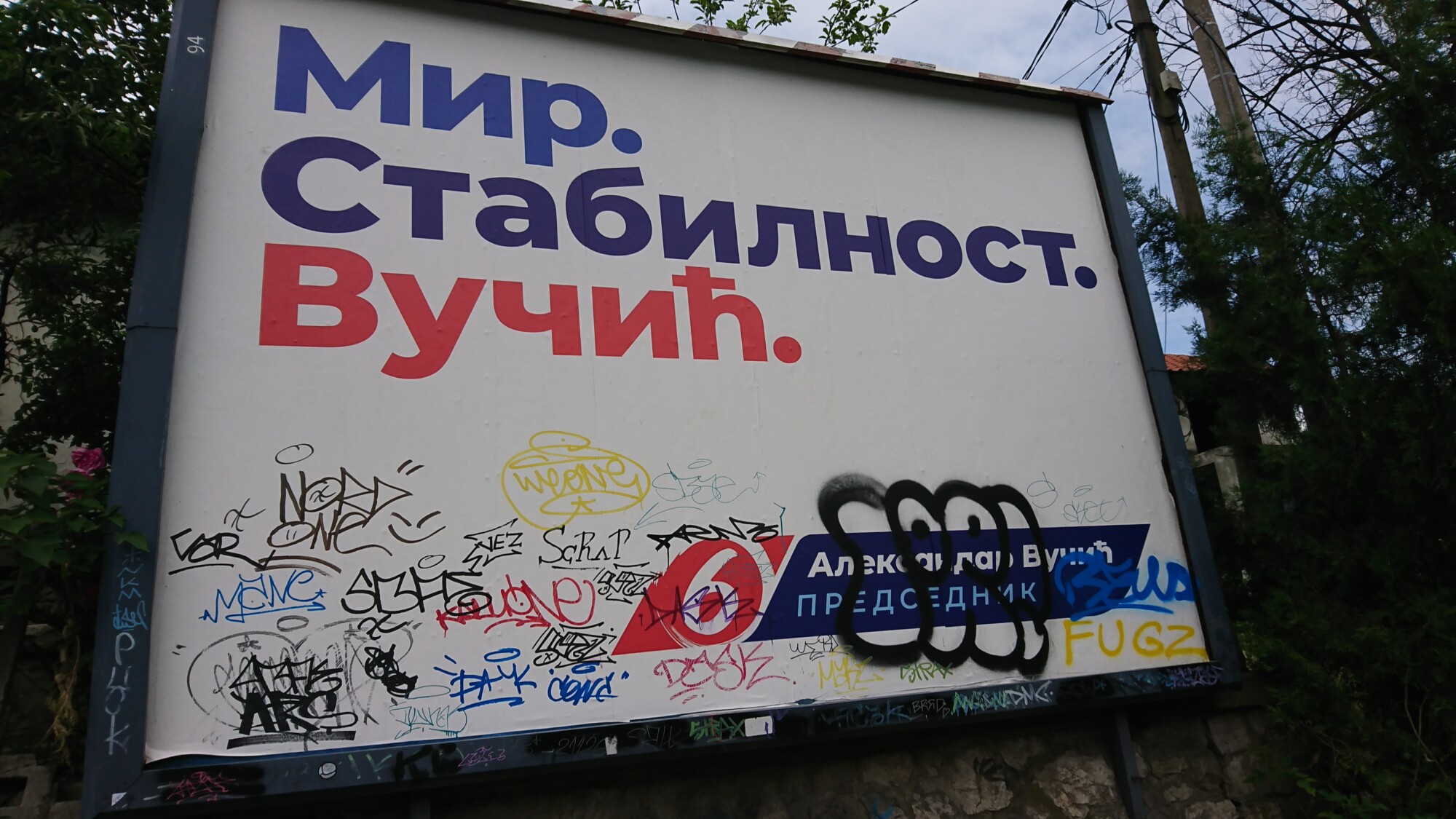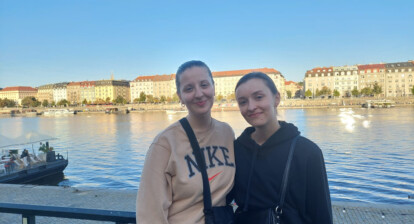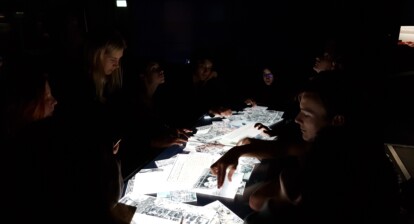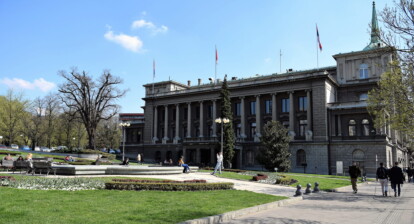Our author Petar is a sociology student in his hometown Belgrade, Serbia. Passionate for social issues and politics, he deals a lot with the current events in his home country. Here are some trends he discovered in the past months.
Sugar, Beans and Promises
One does not often have the opportunity to watch a head of state speak about corn and bean supplies on national television, at least not in the 21st century. But this has been the case in Serbia for months, and has become a familiar sight. Quite often, the president can be seen standing in front of pallets of sugar, flour, sunflower oil or whatever other ingredients are necessary to make a nutritious meal, and while doing so, reassuring his citizens that the country has enough essential food items stockpiled for everyone to survive the next few months. That actually doesn’t sound reassuring at all, does it?
A Paradigm Shift
Many may be familiar with the term “The roaring twenties”, which refers to the second decade of the previous century. To a person not familiar with this term, however, perhaps even the start of the current decade may come to mind. With Covid-19 and something most of us wouldn’t have imagined being possible in the modern world – a war in Europe. The world and also the youth feels as if it’s experiencing a new era of unpredictability. This causes anxiety which is something that those seeking to gain power in society recognise. Throughout history, times of uncertainty have led to the rise of populist figures and even dictators such as Mussolini and Hitler, to name two of the extreme examples.
Having a relatively young democratic system, the western Balkans remain a troublesome region when it comes to nationalist tensions. The ruling parties of the Balkan countries commonly use this in their agendas, with Serbia being no exception. So what is populism and how do young people perceive the challenges we face?
Throwback to The Past…
In the face of an increasingly challenging and complex reality, governments are looking to sustain a decent style of life for their citizens, who have grown accustomed to somewhat stable and predictable lives. After the dissolution of the Socialist states and Yugoslavia, followed by one entire decade of weaponised conflicts in the Balkan States, the fear of war, food or energy shortages is nowadays something quite alien for the young generation. Meanwhile, and due to Serbia’s regrettable involvement in the wars which led to the breakup of Yugoslavia in the ’90s, this is a reality that most older citizens are still familiar with. And which the younger generations learn from a young age, some even witnessing it in their formative years.
…or Anxiety For The Future?
Keeping this in mind, it may seem logical that with these past and current feelings of uncertainty among the population, a political agenda focusing on stability and safety would appeal to most people more than one that encourages topics like domestic innovation or energy transition. The socialist past of the former Yugoslav countries seems to increase the desire for a strong leadership that focuses mainly on issues familiar and important to the common man, at least in the older generations. It is what it is: The western Balkans, and Serbia in particular, are an easy target for movements with a populist agenda. In Serbia, the main issues which are brought up by such movements to stir up fears are the Kosovo issue, immigration from the Middle East and Serbia’s ties to Europe and the US.
Three Students – Three Views
What does the Serbian youth think about it? I interviewed three of my acquaintances, asking them about some focus topics of political parties in Serbia. Teodora (20), Marko (22) and Jana (21) study at the University of Belgrade. Teodora and Marko study sociology while Jana studies informational systems and technologies.
What is your political attitude, and how do you imagine the ideal organisation of a state?
Teodora: If we take the political compass as a reference, I would be in the lower left square, a left-leaning liberal. For me, the best form of state government is a direct democracy.

Teodora (Photo: Private)
Marko: Honestly, I don’t like labelling myself politically. Not to say that I am apolitical, but I just don’t like fantasising about ideal scenarios and ideologies. I suppose the thing that matters most when it comes to statehood is rule of law, which is lacking in our country.
Jana: When it comes to the economy, I’m left-leaning, but socially I’m more towards the right. I guess you could call me demo-Christian in political party terms. For me the ideal form of state organisation is a monarchy; a constitutional monarchy would be fine too.
Do you believe Serbia should strive towards EU integration?
Teodora: When it comes to the integration of Serbia into the EU, I consider all other alternatives as worse off. If we want to be a democratic society, we should at least strive towards European values. At the moment, I see no better option than joining the European Union.
Marko: I don’t think this is a question people should be so polarised about. For me, a mix of peoples and cultures should exist. It makes contact and exchange easier. But on the other hand, we should avoid individual cultures and languages losing shape while morphing with others.
Jana: I am against Serbia’s entry into the European Union. Historically and geopolitically, we don’t belong to that part of the world.
What is your opinion regarding Kosovo and its status?

Marko (Photo: Private)
Teodora: Kosovo is a very delicate topic. In my opinion, the dragging on of the Kosovo question for decades has caused more harm than good. Serbia ought to accept Kosovo’s independence. We should try to build a good relationship in the future. Of course, I am in favour of creating a community of Serbian municipalities while the remaining Serbian population should be supported by our state.
Marko: If I understand the question correctly, it aims at conspiracy theories. That someone is trying to “sell out” Kosovo. I don’t think the people in power here have those intentions. But I do believe that the policy regarding Kosovo needs to adapt to a goal of multi-nationality. Meaning the goal of calming all the ethnic tensions in the region. It probably needs some generations to pass to achieve that.
Jana: Kosovo is an inalienable part of Serbia, both historically and constitutionally. No compromises should be agreed upon that would separate it from the rest of the country.
Seven years ago, Serbia found itself on the path of something that concerned many European countries. The 2015 European migrant crisis. Even though Serbia was not at all one of the end destinations of most migrants, their sudden entry into the country was seen as controversial. Even today, the issue remains a hot topic in right-wing circles.
What is your attitude towards illegal immigration?
Teodora: The state is responsible to help the immigrants as much as it can while they are here. The influx of people is good for Serbia, considering the high level of emigration from here.
Marko: One should keep in mind that immigration was common among Europeans not too long ago too, during wars and other disasters. The idea that we shouldn’t accept immigrants and make them leave our country is hence nonsensical. On the other hand, illegal immigrants that arrive in our country often come from very distant parts of the world where local customs are different than ours. Specific programs should exist for their integration into society, so they can adapt more easily, be less ostracised, and gain respect for the local culture.
Jana: I’ve nothing against immigration as long as the passage and entry of immigrants are regulated by law. And as long as those immigrants do not have any benefits over Serbian citizens socially or judicially. Also, they should respect the local culture and not pose a threat to it as long as Serbia is their temporary or permanent host.

Jana (Photo: Private)
How do you estimate the role of populism in Serbia?
Teodora: If we define populism as the tendency of the ruling party to abuse the lower level of education of the lower classes as a means of gaining power, and later retaining it, I think the definition fits Serbia perfectly. Another aspect of populism is that the ruling party antagonises all opposition parties and figures. Which happens daily in Serbia, and it doesn’t just happen to politicians; it even happens to journalists. One journalist even found his house burnt down.
Marko: If by populism you mean the idea that a group presents itself as opposed to the “elite” and working with the people, then I think the term is overused, as the ruling party here doesn’t have as much power as it’s sometimes presented. I think it’s one of those terms that’s misused because of its broad meaning.
Jana: Populism is the adaptation of specific publicly visible actions in a light that the public wants to see. And in that sense, it is definitely present here. Quite often, it’s the way political parties gain power.
Change Doesn’t Come Easily
We have many answers, but do we have a conclusion? One thing I noticed while talking to the interviewees was their seemingly very realistic outlook on the future. Their disillusionment was visible while answering questions involving ideal scenarios. Even though they wished for their visions of the society to become a reality, they seemed aware of the grinding, inert nature of mass society. Change doesn’t come easily, and often, it doesn’t come at all. Perhaps this pessimism is something populist movements use as well, quite cynically. Recently, the favorite in the elections – the Serbian progressive party – changed its election slogan from “Actions speak for themselves” to “Peace, stability, Vučić (current president and then, candidate) “.
Many found the new slogan grim, as it seemed to be offering the bare minimum – Serbia not going to war and its relative well-being, but not an improvement. The difference between the way young people vote and the way old people decide can sometimes even be comical. In some cases, people even try stopping their own parents from going to the polling stations because oftentimes, “baby-boomer” parents and their kids have opposing views. And it’s the baby boomers who prefer populist options.
Where Should we go?
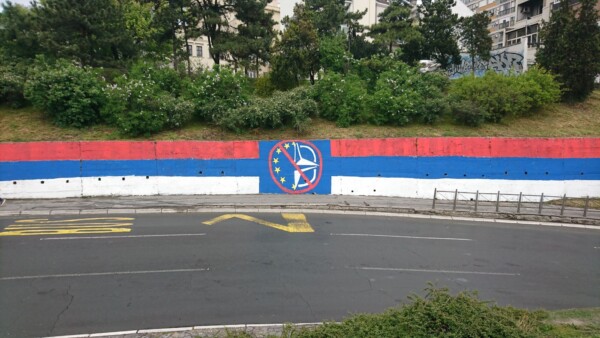
Anti-NATO and EU graffiti near Brankov most in the centre of Belgrade (Photo: Private)
Perhaps one of the most discussed political issues in Serbia is that of how it should align itself. While the current government is trying to emulate Yugoslavia’s foreign policy of sitting in between two currents of world power, it’s not sure how long it can keep doing so. Things are arguably worse now than they were during the Cold War. A brutal “hot war” waging right here, not so far away in Eastern Europe. This could impact not just Ukraine and Russia, but other countries as well. The populist government in Belgrade has been warming to Russia, as well as to Viktor Orban’s populist government in Budapest by sharing an increasingly Europhobic stance and emphasising “sovereignty”.
The End of Sweet Promises?
At the same time, the state media continues to spread propaganda glorifying and wishing for the return of Kosovo to Serbia, while encouraging an “us versus them” worldview among its citizens. The government hoards essential items such as grain, sugar and rice, and then shows them on TV, inspiring ordinary citizens to do the same. The president speaks of the nuclear apocalypse on national television, while at home, fearful citizens watch with sugar reserves sitting behind them. The populace seems hooked on the sweet promises, rice, and sugar served to them, and the youth of Serbia is becoming more and more disillusioned. A sugar rush only lasts so long.

